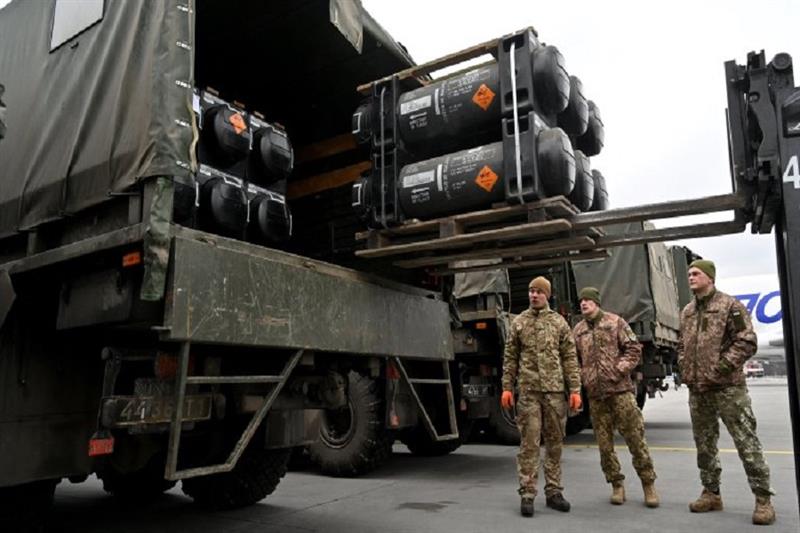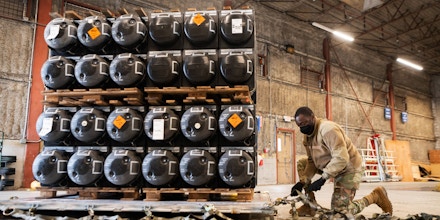
The Pentagon is sending more than a billion dollars in new arms to Ukraine, including air defense systems, counter-drone equipment, 155mm artillery rounds, and using unspecified "commercial satellite imagery services." 
The Defense Department announced the package Tuesday morning under the authorization known as the Ukraine Security Assistance Initiative, which is an $18 billion fund that pulls "capabilities from industry or partners," and marks the "beginning of a contracting process to provide additional priority capabilities to Ukraine." Just over $11 billion of that USAI fund has been used over 10 separate times since the start of the full-scale invasion 14 and a half months ago, according to the State Department.
New: The British military "appears poised to send Kyiv the long-range missiles the Biden administration has long denied it," according to the Washington Post, reporting Monday evening from a procurement alert issued last week. Fine print: "No final decision has been made, according to a British official who declined to confirm the type, timing or quantity of weaponry under consideration," the Post's Karen DeYoung reported. "But the notice is a substantive step toward Britain itself supplying such munitions, and the requested specifications and capabilities closely match its air-launched Storm Shadow cruise missiles."
Fine print: "No final decision has been made, according to a British official who declined to confirm the type, timing or quantity of weaponry under consideration," the Post's Karen DeYoung reported. "But the notice is a substantive step toward Britain itself supplying such munitions, and the requested specifications and capabilities closely match its air-launched Storm Shadow cruise missiles."
Why it matters: With a range of nearly 200 miles, the missiles would allow Ukrainian forces to hit Russian positions inside occupied Crimea.
Coming up: NATO defense chiefs are to meet Wednesday at alliance headquarters in Brussels. The first planned session will concern "The military situation in and around Ukraine," according to the public agenda. The second session will center around the NATO summit scheduled next month in Lithuania. Finland will officially join the alliance for that annual event. And nearly all of the rest of the alliance's 30 members are hoping to see Sweden join NATO as well by that time. Turkey remains the key holdout in that accession process; but Hungary's parliament, which is led by the far-right Viktor Orban, has not yet ratified Sweden's accession either.  European Union President Ursula von der Leyen visited Kyiv Tuesday to unveil the bloc's 11th round of sanctions against Russian entities. Sanctions evasion is a big theme for this latest tranche, she wrote on Twitter after an outdoor appearance in the capital alongside President Volodymir Zelenskyy.
European Union President Ursula von der Leyen visited Kyiv Tuesday to unveil the bloc's 11th round of sanctions against Russian entities. Sanctions evasion is a big theme for this latest tranche, she wrote on Twitter after an outdoor appearance in the capital alongside President Volodymir Zelenskyy.
Alongside Zelenskyy, von der Leyen marked May 9 in Kyiv. May 9 was the day the Nazi regime was officially defeated in 1945. She also said she "warmly welcome[d]" Zelenskyy's suggestion that May 9 be known as "Europe Day" to emphasize the collective victory over tyranny.
"Courageously, Ukraine is fighting for the ideals of Europe that we celebrate today," von der Leyen said in Kyiv. "In Russia, [Vladimir] Putin and his regime has destroyed these values. And now they are attempting to destroy them here in Ukraine—because they are afraid of the success you [Zelenskyy] represent, and the example you show. And they are afraid of your path to the European Union," she said.
It's worth repeating, however, that "[O]utside Europe and North America, the defense of Ukraine is not front of mind," said David Miliband, CEO of the International Rescue Committee, writing in the latest print issue of Foreign Affairs. "Few governments endorse the brazen Russian invasion, yet many remain unpersuaded by the West's insistence that the struggle for freedom and democracy in Ukraine is also theirs," he cautioned.
Miliband's advice: "Western governments should frame the conflict as one between the rule of law and impunity or between law and anarchy rather than one that pits democracy against autocracy." Doing so, he argued, "tests China at its weakest point because China claims to support a rules-based international system. It also sounds less self-regarding, which is important given the obvious problems plaguing many liberal democracies." Read the rest of that useful glimpse in the mirror for Ukraine's Western allies, here.
Russian leader Vladimir Putin marked Victory Day with a considerably muted parade through Moscow's Red Square—a parade that saw only one single T-34 tank the entire time, which is a marked contrast from years past. The parade's aerial flyover was canceled this year, too, the Associated Press reported.
"This is weak. There are no tanks," one Russian told AP. However, she added dutifully, "We're upset, but that's all right; it will be better in the future." AP has more on Putin's predictable message of defiance, here; Reuters has this; you can also review a Cold War historian's take.
Russia says it wants to make 1,500 new tanks per year, according to Dmitry Medvedev. But Russian independent news outlet (it's incredible any still exist) Verstka reportedly says workers at the country's largest armored vehicle manufacturer point to several factors that appear to be undermining production. Those include "poor wages, difficult working conditions, staff shortages, unfilled vacancies," and mobilization drives.
Meanwhile in Ukraine, "More than 170,000 square kilometers of our territory are contaminated with mines and unexploded ordnance," President Zelenskyy said in his evening address Monday. So, he said Ukraine's military is "actively working with partners to increase our capabilities" for demining, including the "training of sappers and pyrotechnicians" and collaborating "with everyone in the world who has the experience, who has the technology, who has the financial capacity to support us to make Ukraine clear of Russian mines again."




No comments:
Post a Comment
Note: Only a member of this blog may post a comment.